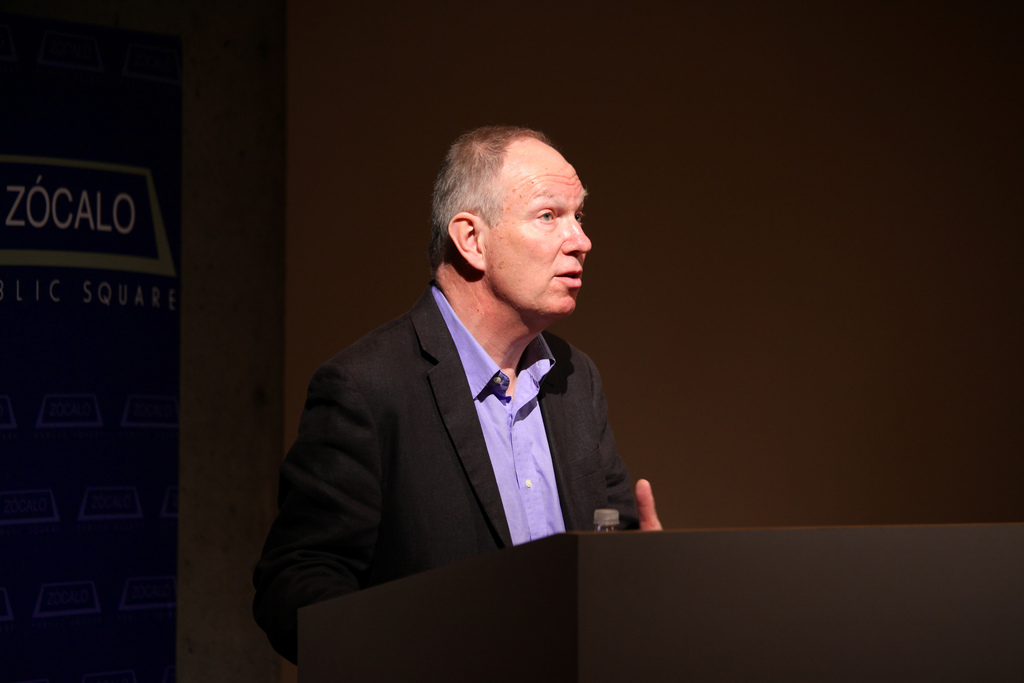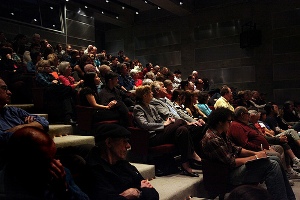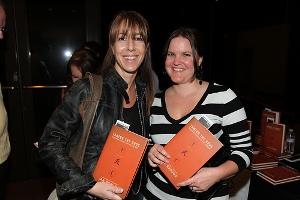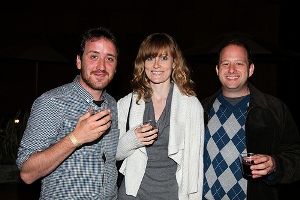
Ian Buruma grew up in Holland with an atheist father and a Jewish mother. Quoting writer Adam Gopnick, he said his family expressed that faith only “in the zeal with which they celebrated Christmas.”
“We had to have a bigger Christmas tree than the goyim,” he joked with the crowd at MOCA Grand Avenue. While his Holland, he said, was still a profoundly religious place in the 1960s, today’s Western Europe thinks of religion as “a problem that we had licked by now.”
Buruma, author of Taming the Gods: Religion and Democracy on Three Continents, explained why religion remains dangerous for democracy, whether there is room for compromise with fundamentalists, and whether we can ever get rid of religion all together.
Joseph Conrad, not the Koran
 Theocratic religious revolutions and democracies are clearly incompatible, Buruma asserted. Political power cannot come from the same source as the absolute truth of religion. “Regimes based on the claim to absolute truth are rather rare in the world,” he said. In the Middle East, with Iran being something of an exception, most governments are run by secular dictatorships that treat Islamist movements with brutality, sometimes further politicizing believers. As Buruma noted in Q&A, “The church is the place where you can mobilize people around an alternate form of morality.”
Theocratic religious revolutions and democracies are clearly incompatible, Buruma asserted. Political power cannot come from the same source as the absolute truth of religion. “Regimes based on the claim to absolute truth are rather rare in the world,” he said. In the Middle East, with Iran being something of an exception, most governments are run by secular dictatorships that treat Islamist movements with brutality, sometimes further politicizing believers. As Buruma noted in Q&A, “The church is the place where you can mobilize people around an alternate form of morality.”
Religiously inspired violence is more common than religious governments, and dangerous, he said. Religious violence most often comes from those children of immigrants who feel alienated both from their parents’ culture and from the mainstream in their country of birth. “They’re vulnerable to great revolutionary causes, as young people often are, especially young men,” Buruma said. “It has very little to do with Islam per se.” The killer of Dutch filmmaker Theo Van Gogh, Mohammed Bouyeri, for instance, was born in Holland to a Moroccan guest worker. He liked football, drank alcohol, chased girls, but “felt rejected for one reason or another, sometimes imagined sometimes real.” He studied Wahhabi Islam on the Internet, in English, which Buruma characterized as a “purist, born-again Islam…which appeals to people who don’t have traditional roots.”
“If you want to understand such people, it’s no good reading the Koran,” Buruma said. “It’s much more useful to read Joseph Conrad,” on anarchists in the 20th century, the man in the coat with a bomb in his pocket.
Forever 1938
The problem with the Western world’s response to religious violence, Buruma said, is a conflation of a number of distinct problems . The first, he said, is a common problem for all immigrant societies: the first generation is culturally dislocated, undereducated, and underemployed, leading to street and petty crimes. “That is frightening to mainstream society,” he said. As Buruma noted in Q&A, citizenship can exacerbate a sense of not belonging; laws vary across Europe and the reform or regularization of them is a “hugely fraught issue.” Second, believers of different religious can have particular and quite distinct views on, for example, relations between men and women, which can cause friction. And finally, a small portion believes in revolutionary violence in the name of Islamism.
 These problems are not the same threat, though many believe them to be, and “quite deliberately use the vocabulary of World War II,” Buruma said. “In the minds of those against Eurabia, it is forever 1938.” They fear being demographically overwhelmed, even though by the third generation, descendants of immigrants aren’t likely to have any more children than other native-born, and “many will have lost their faith by then,” or found ways to reconcile it with democracy.
These problems are not the same threat, though many believe them to be, and “quite deliberately use the vocabulary of World War II,” Buruma said. “In the minds of those against Eurabia, it is forever 1938.” They fear being demographically overwhelmed, even though by the third generation, descendants of immigrants aren’t likely to have any more children than other native-born, and “many will have lost their faith by then,” or found ways to reconcile it with democracy.
Atheist converts
Recognizing these problems as distinct lets Western democracies incorporate the majority of believers who don’t wish to unleash violence. Democracies have to emphasize economic politics over religious politics. The latter are based on “some promise of redemption, an ideal state in the future, to which we have to sacrifice a claim to absolute truth,” Buruma said. Economic politics is about interests, compromises, “wheeling and dealing,” the key elements of a liberal democracy. Still, he said, believers in economic politics can be just as zealous as their religious counterparts, Buruma noted, citing Otto von Bismarck’s kulterkampf against the Catholics as one example.
And as far as opposing religion in politics goes, the left can be as harsh as the right, Buruma said. The Salman Rushdie fatwa illustrated this particularly well: “There was a dogmatic anticlericalism among so-called progressives who came from religious families and converted to atheism, and have all the zeal of converts.”
Believe in soccer
The key question for Western democracies is whether compromise is possible with religious politics, and “with people whose political views are largely inspired by religious faith,” Buruma said, from Muslims to Christians. Violence cannot be compromised with, Buruma said. But nonviolent believers do well in democracies: Muslim parties function well in countries like Indonesia and Turkey. Religion, furthermore, can improve a democracy, as Martin Luther King’s views on civil rights were inspired by his faith and, after debate, entered the mainstream of political thought. Religion can also contain violence just as well as it can incite it, like soccer, Buruma said. “To call religion irrational would be true, but it’s not really helpful,” he said. “Sports and religion ritualizes violent impulses, or indeed, notions of death and decay.”
Rushdie claimed that political debate with believers about religion was possible, so long as criticism focused on the belief and not the believer. As Buruma noted, however, “The distinction doesn’t quite hold to a true believer.”
Believe in celebs
 Bans – whether of acts offensive to religion or expressions of religion – are not an ideal way to go, Buruma said. He noted he is against the banning of burqas or veils, considering such laws “rather silly.” For an American publishing house to refuse to print the infamous Danish cartoons of Mohammad, he said, was cowardly. “You allow violence to influence public discourse in a way that is highly undesirable.”
Bans – whether of acts offensive to religion or expressions of religion – are not an ideal way to go, Buruma said. He noted he is against the banning of burqas or veils, considering such laws “rather silly.” For an American publishing house to refuse to print the infamous Danish cartoons of Mohammad, he said, was cowardly. “You allow violence to influence public discourse in a way that is highly undesirable.”
Buruma cited one a noteworthy case of considering banning a religious practice. Academic Tariq Ramadan was asked by Nicolas Sarkozy whether he was against the stoning to death of adulterous women. Ramdan argued for a moratorium on the practice, but left further discussion to religious leaders. While many thought the response outrageous, one French scholar pointed out that Ramadan was making an attempt to separate church from state: creating a secular ban while leaving religious beliefs to believers. “Whether this is entirely convincing or not, I don’t know, but it’s something to think about,” Buruma said.
Ultimately, as he noted in Q&A, religion is here to stay – we will always be frightened of death and seek meaning in life. “If you ban religion, then what do you get? At best you find religious expression in rock concerts or the worship of celebrity,” he said. “Having it pop up in secular ways is just as dangerous – Maoism, Stalinism, Hitlerism…. You cannot ban God. All you can hope for is to tame the gods.”
Watch the video here.
See more photos here.
Buy the book here.
Read Buruma’s In The Green Room Q&A here.
*Photos by Aaron Salcido.




Send A Letter To the Editors